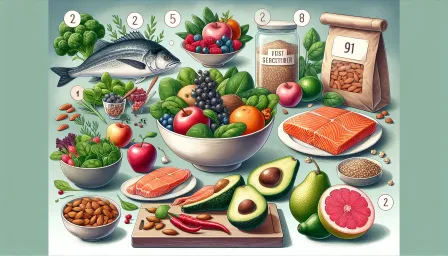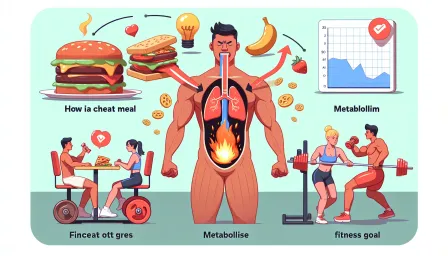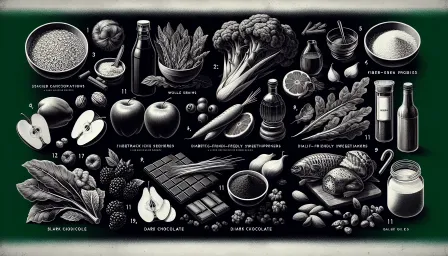Understanding Metabolic Rate and Diet: A Comprehensive Guide

Dive into our comprehensive guide on metabolic rate and diet. Learn how they interact, affect your health, and discover strategies for effective weight management.
Introduction
Metabolic rate and diet are crucial concepts for anyone interested in maintaining a healthy lifestyle, weight management, or athletic performance. This comprehensive guide aims to demystify these terms, explaining their importance, how they interplay, and providing actionable strategies to optimize your health.
What is Metabolic Rate?
The term "metabolic rate" refers to the rate at which your body burns calories to sustain its vital functions. It can be broken down into several components:
- Basal Metabolic Rate (BMR): The number of calories your body requires at rest to maintain basic physiological functions such as breathing, circulation, and cell production.
- Resting Metabolic Rate (RMR): Similar to BMR but slightly higher, accounting for additional activities such as digestion.
- Total Daily Energy Expenditure (TDEE): The total number of calories burned in a day, including all activities from sleeping to exercising.
Factors Affecting Metabolic Rate
Genetics
Genetic makeup significantly influences your metabolic rate. Some people naturally have faster metabolisms due to the genetic inheritance of certain metabolic pathways, muscle mass, and body composition.
Age
As we age, our metabolic rate typically slows down. This is partly due to a decrease in muscle mass and a slower rate of cellular respiration.
Sex
Generally, men tend to have a higher metabolic rate compared to women because of greater muscle mass and lower body fat percentage.
Body Size and Composition
Individuals with more muscle mass burn more calories at rest. Likewise, larger bodies require more energy to maintain basic functions, affecting metabolic rate.
Activity Level
Physical activity increases your Total Daily Energy Expenditure (TDEE). Regular exercise boosts muscle mass, which in turn can elevate your BMR.
The Role of Diet in Metabolic Rate
Your diet significantly affects your metabolic rate. The types of foods you consume can either boost your metabolism or slow it down.
Macronutrients
Different macronutrients are metabolized at different rates:
- Proteins: Protein-rich foods have a higher thermic effect, meaning your body uses more energy to digest them, thus temporarily boosting metabolic rate.
- Carbohydrates: Carbs are broken down quickly for immediate energy or stored in muscles and liver as glycogen.
- Fats: Dietary fats are essential but are metabolized slower than proteins and carbs, leading to lower immediate energy expenditure.
Meal Frequency
Frequent, smaller meals can help maintain a steady energy level and prevent metabolic slowdowns, although the impact varies from person to person.
Hydration
Staying hydrated is essential for maintaining an optimal metabolic rate. Water is involved in various metabolic processes, and dehydration can slow down metabolism.
Dietary Considerations to Boost Metabolism
Incorporating certain foods and dietary habits can help to boost your metabolic rate:
- Protein-Rich Foods: Eggs, lean meats, and legumes.
- Spices: Foods like chili peppers contain capsaicin, which can temporarily boost metabolism.
- Green Tea and Coffee: Contain compounds and caffeine that can increase metabolic rate.
Common Myths About Metabolic Rate and Diet
Starvation Mode
There is a widespread belief that eating too little will cause your body to go into "starvation mode," significantly slowing down metabolism. While severe calorie restriction can reduce your metabolic rate, it does not happen as quickly or drastically as commonly thought.
Fat-Burning Foods
Another myth is that certain "superfoods" can drastically increase your metabolism to the point of effortless weight loss. No single food can make such a significant impact, though a balanced diet can support healthy metabolism.
Strategies for Optimizing Metabolic Rate and Diet
Balanced Nutrition
Ensure your diet includes a healthful mix of macronutrients: proteins, carbohydrates, and fats. A balanced diet supports overall metabolism and energy levels.
Regular Exercise
Both aerobic exercises and strength training are essential. While cardio improves cardiovascular health and burns calories, strength training builds muscle mass, which can increase your BMR over time.
Quality Sleep
Adequate sleep is crucial for metabolic health. Poor sleep patterns can disrupt hormonal balances that regulate metabolism.
Stay Hydrated
Drink plenty of water to facilitate metabolic processes and maintain overall health.
Avoid Extreme Diets
Extreme calorie restriction or fad diets can harm your metabolism. Instead, aim for sustainable dietary habits that provide long-term benefits.
Conclusion
Understanding the relationship between metabolic rate and diet is essential for anyone looking to improve their health or manage their weight effectively. By considering factors such as genetic predispositions, dietary habits, and exercise routines, you can find a balance that works for you. Use this guide as a foundation to make informed decisions that will support your long-term health and wellness goals.



























